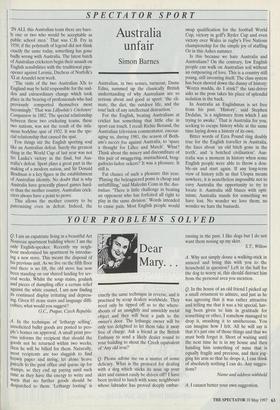SPECTATOR SPORT
Australia unfair
Simon Barnes
'IN ALL this Australian team there are bare- ly one or two who would be acceptable as public school men.' That was C.B. Fry in 1938; if the polymath of legend did not think exactly the same today, something has gone badly wrong with Australia. The latest batch of Australian cricketers begin their assault on English sensibilities with the traditional pipe- opener against Lavinia, Duchess of Norfolk's XI at Arundel next week.
'The visits of the two Australian XIs to England may be held responsible for the sud- den and extraordinary change which took place in the bearing of professionals who had previously comported themselves most becomingly.' That was Lil4rwhite's Cricketers' Companion in 1882. The special relationship between these two cricketing teams, these two nations, was not the result of the infa- mous bodyline spat of 1932. It was the spe- cial relationship that caused the spat.
Few things stir the English sporting soul like an Australian defeat. Surely the greatest thing in the World Cup of last year was not Sri Lanka's victory in the final, but Aus- tralia's defeat. Sport plays a great part in the making of a modern nation, and Sir Donald Bradman is a key figure in the establishment of Australian identity. No doubt that is why Australia have generally played games hard- er than the mother country. Australian crick- eters always have a point to prove.
This allows the mother country to be Patronising even in defeat. Indeed, the Australian, in two senses, turncoat, Dame Edna, summed up the classically British understanding of why Australians are so serious about and good at sport: 'the cli- mate, the diet, the outdoor life, and the total lack of any intellectual distraction.'
For the English, beating Australians at cricket has something that little else in sport can touch. I recall Richie Benaud, the Australian television commentator, encour- aging us, during 1981, the season of Both- am's succes fou against Australia, to 'spare a thought for Lillee and March'. What? Think about the misery and discomfiture of this pair of swaggering, mustachioed, brag- gadocio-laden ockers? It was a pleasure. It still is.
Fat chance of such a pleasure this year. 'Playing the beleaguered poms is cheap and unfulfilling,' said Malcolm Conn in the Aus- tralian. 'There is little challenge in beating an opponent who has forfeited all right to play in the same division.' Words intended to cause pain. Most English people would swap qualification for the football World Cup, victory in golfs Ryder Cup and even victory over Wales in rugby's Five Nations championship for the simple joy of stuffing Oz in this Ashes summer.
Is this because we hate Australia and Australians? On the contrary, few English people can walk on Australian soil without an outpouring of love. This is a country still young, still inventing itself. The class system has been shoved down the dunny of history: Wozza madda, do I stink?' the taxi-driver asks as the pom takes his place of splendid isolation in the back.
In Australia an Englishman is set free from his past. 'History', said Stephen Dedalus, 'is a nightmare from which I am trying to awake.' That is Australia for you, seeking to escape history while at the same time laying down a history of its own.
Bitter words of Ezra Pound ring doubly true for the English traveller in Australia, the lines about 'an old bitch gone in the teeth', and 'a botched civilisation'. Aus- tralia was a moment in history when some English people were able to throw a dou- ble-six and start again. If any long-term view of history tells us that Utopia means nowhere, it is nonetheless impossible not to envy Australia the opportunity to try to locate it. Australia still blazes with opti- mism; Australia stands for something we have lost. No wonder we love them; no wonder we hate the bastards.


































































 Previous page
Previous page